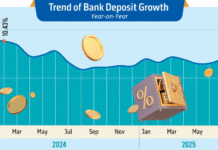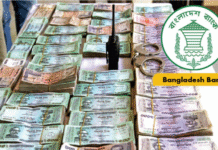
The central bank should make lending to pandemic-hit cottage, micro, small and medium enterprises (CMSMEs) from the stimulus package collateral-free to accelerate disbursement of the fund as many of them are struggling to stay afloat because of a shortage of finances, speakers said yesterday.
Bangladesh Bank should have asked banks not to demand any collateral when it announced the Tk 20,000-crore stimulus package so that a significant number of the cash-strapped CMSMEs could avail the soft loan, they said.
“The central bank should have taken care a lot earlier to help CMSMEs overcome the Covid-19 fallout,” said Syed Nasim Manzur, managing director of Apex Footwear Ltd and a core group member of the Citizen’s Platform for SDGs, Bangladesh.
“Studies show that the units that availed the money from the fund have benefited,” said Debapriya Bhattacharya, convenor of the Citizen’s Platform for SDGs, Bangladesh and a distinguished fellow of the Centre for Policy Dialogue.”
“The CMSMEs are lagging because their voices were not raised strongly with the government’s decision-making level.”
They made these comments while speaking at a virtual dialogue on ‘post-pandemic status of CMSMEs and effectiveness of stimulus packages’.
The Citizen’s Platform for SDGs Bangladesh, a platform of non-state actors and their networks and associates, and the Business Initiative Leading Development (BUILD) jointly organised the meeting.
CMSMEs play a significant role in the country’s economy and employment generation.
The number of CMSMEs in Bangladesh is 7.76 million. Of them, 99.84 per cent are privately owned, said Abul Kasem Khan, chairperson of the BUILD, in his keynote paper.
Of the total industrial employment, 80 per cent are in the CMSMEs. The units account for 35.5 per cent to 50 per cent of the total employment in Bangladesh.
Tk 59,292 crore are available in the form of loans for the CMSMEs under different categories. Of the sum, Tk 4,120 crore, or 20.5 per cent, was disbursed among 11,183 firms from the Tk 20,000 crore stimulus package for the CMSME.
Another Tk 1,060 crore was disbursed from another stimulus package of Tk 3,000 crore, Kasem said.
Nasim Manzur said the government should have given subsidies on VAT, tax, utilities and factory and office rents during the difficult period to CMSMEs so that they can survive and continue their operations.
Many CMSMEs have had to shut their business because of high rents and office rents. The government should have announced the stimulus packages in consultation with other stakeholders so that all units get the fund properly, he said.
The entrepreneur called for involving NGOs, microfinance institutions and local chambers so that the real sufferers could be identified and the funds can be disbursed on time.
Many CMSMEs need to get a source tax waiver during this tough time and district chambers should introduce help desks for CMSMEs to secure the fund, said Manzur.
Bhattacharya said it is not wise only to depend only on banking channels to bankroll CMSMEs.
“Alternatives should also have been thought about a lot earlier because many enterprises have been doing business for many years but they are still unbanked.”
Momtaz Uddin Ahmed, an honorary professor of economics at the University of Dhaka, said there should be an updated database of the CMSMEs so that every unit can avail financing from the fund. He supported financing CMSMEs through MFIs.
Mustafizur Rahman, another distinguished fellow of the CPD, said CMSMEs not only serve the local markets. They also help a lot in value addition for export-oriented sectors.
Shams Mahmud, president of the Dhaka Chamber of Commerce and Industry, said there is a perception that the money from the stimulus package is free. “People should change such mentality as it is a loan, but at a lower interest rate.”
The definition of SMEs needs to be changed to make the initiative time-befitting, the industries minister said. He committed to preparing a database of the CMSMEs.
Syed Almas Kabir, president of the Bangladesh Association of Software and Information Services, said none of 1,500 members of the association received loans from the stimulus packages as IT companies cannot provide any collateral.
IT and software companies do not have physical assets to be mortgaged as collateral. However, BASIS members secured loans from two private commercial banks under special arrangements, he said.
Anwara Ferdousi, president of the Rangpur Women Chamber of Commerce and Industry, said handicrafts and beauty parlours are the worst suffers as they did not get loans from banks. “Banks are not giving loans to small entrepreneurs because of collaterals.”
Humaira Chowdhury, co-founder and managing director of Frontier Technologies Ltd, said she is not getting loans from banks although her company has a strong financial base.
She could not provide collateral as she has not managed to get land documents from her paternal side. “So, banks are not giving me loans.”
Syed Abdul Momen, head of SME of Brac Bank, said of his bank’s total portfolio of Tk 12,000 crore, Tk 10,000 crore are collateral-free loan for the CMSMEs.
Some 70 per cent to 80 per cent of the CMSMEs that have received the loan from the stimulus package have returned to their businesses, he said.
Asif Ibrahim, chairman of the Chittagong Stock Exchange, also spoke.









